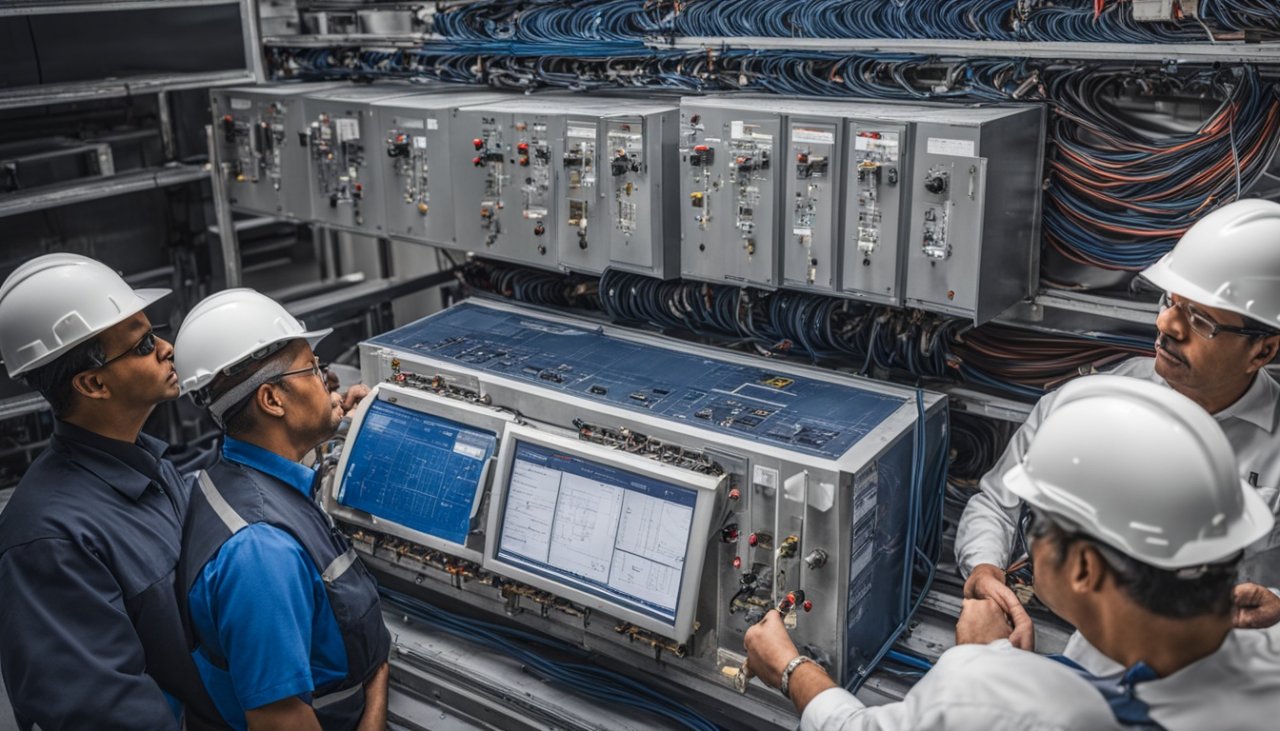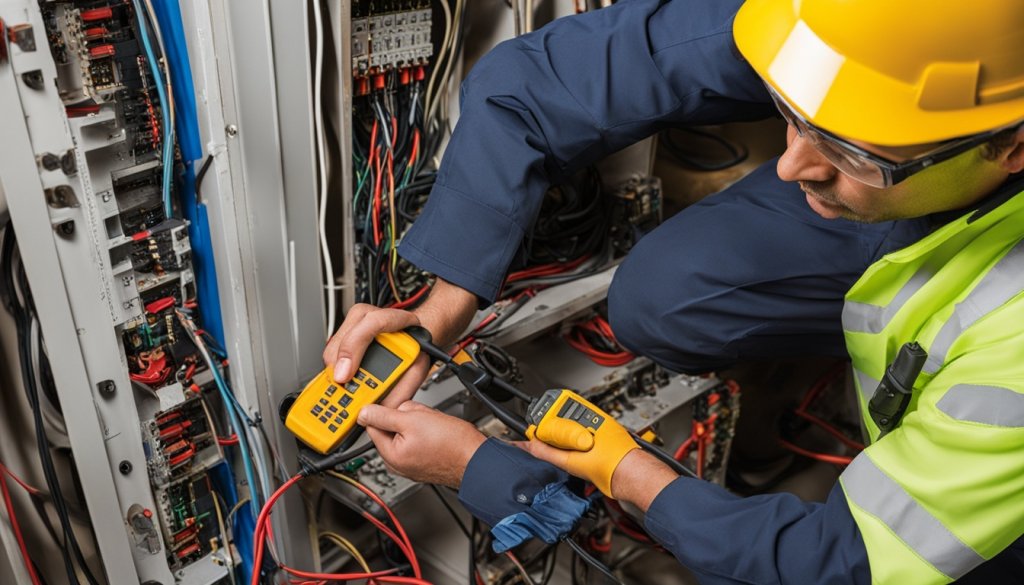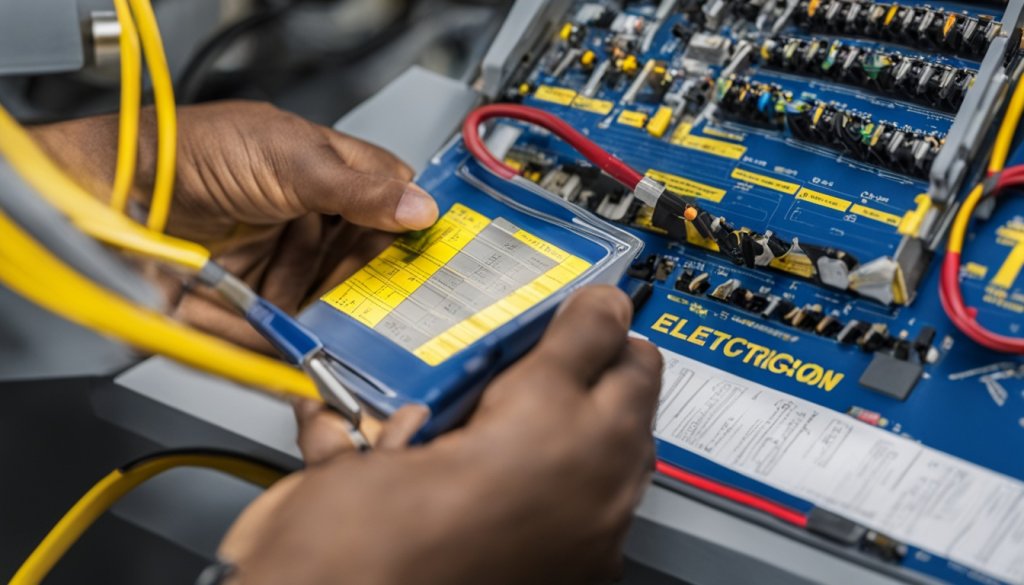Have you ever thought about the dangers hidden in your home or business? These risks could harm your family or workers. Following electrical codes and standards is key to keeping everyone safe. It’s not just about rules; it’s about protecting lives and property.
Groups like Southern Electrical Service Co. (SESCOS) and Streamline Electric, Inc. highlight our shared duty. They remind us that homeowners and experts must work together. This ensures our spaces are safe and reliable.
Knowing about NEC requirements and electrical safety standards is crucial. It’s not just for professionals. It’s essential for protecting your property and giving you peace of mind. Let’s explore why these codes are important and how they keep us safe.

Key Takeaways
- Electrical codes prevent shocks and fires, making everyone safer.
- Following the law is a must, with big risks for not doing so.
- Improper electrical work can affect your insurance.
- Using energy-efficient ways saves money and helps the planet.
- Regular checks spot any electrical issues early.
- Choosing skilled electricians means following safety rules.
Understanding Electrical Codes
Electrical codes are key rules for installing and keeping up electrical systems. They range from local to national levels, with the National Electrical Code (NEC) being the top standard. It gives clear instructions for wiring in both homes and businesses, making sure electrical systems are safe and work well. It’s crucial to know these rules for anyone working with electricity.
Types of Electrical Codes
Every area has its own changes to the NEC, based on local building codes and safety needs. Following these electrical codes is a must for legal reasons and to protect lives and properties. For homeowners, knowing both local and national electrical codes is key to making sure electrical work is safe. Not following these rules can lead to big legal problems, fines, and safety risks.
Importance of Staying Updated
It’s vital to keep up with national electric code updates for both pros and DIYers. Electricians and those doing electrical work on their own should keep learning through training and exams. This ensures I meet the latest electrical codes and give my clients the safest electrical solutions.
Staying current with these updates helps avoid accidents and injuries. It also shields me from legal trouble that could happen if I don’t follow the rules. Knowing and following electrical codes makes our homes and communities safer for everyone.
Why Electrical Code Compliance Matters
Following electrical codes is key to keeping homes and workplaces safe. These rules stop serious dangers like fires or electrical shocks. They help prevent tragic events.
Safety and Protection
Every year, about 500 people die in house fires in the U.S. Another 2,300 get hurt. Faulty wiring is often the cause, leading to big damage.
By following safety standards, like the National Electric Code (NEC), we can lower these risks. The NEC sets clear rules for wiring. It stresses the need for Ground Fault Current Interrupters (GFCI) in kitchens and bathrooms to protect people.
Legal and Financial Implications
Not following electrical codes can lead to big legal problems. You might face fines and other legal issues. Also, insurance and liability concerns can come up if work doesn’t meet safety standards.
Insurers often check for safety code compliance before covering claims. If a fire or injury happens because of code violations, claims could be denied. This leaves homeowners paying for damages. Following these codes is not just legal, but it also makes properties more valuable. Buyers like knowing a place is safe and meets codes.
National Electrical Code (NEC) Requirements
The National Electrical Code (NEC) is key for keeping electrical systems safe in homes and businesses. It has strict rules for designing, installing, and checking electrical work. With over 1000 pages, it changes every three years to keep up with new safety rules and tech.
Knowing the NEC is a must for homeowners and electricians. It makes sure electrical work is safe and works well.
Overview of NEC
The NEC is vital for meeting safety standards. It sets clear rules to protect people and property. Since 1971, it has made homes safer by requiring Ground Fault Circuit Interrupters (GFCIs) in high-risk areas.
This has greatly cut down on home electrocutions. Now, Arc-Fault Circuit Interrupters (AFCIs) are also used, which can stop about 50% of electrical fires each year.
Local Amendments and Regulations
Even though the NEC sets the national standard, local areas can add their own rules. Most states follow the latest NEC rules, but local codes are also important. Knowing both national and local rules is key for safety and following the law.
Electricians often use the NEC Handbook for detailed info and cross-references. This shows how important it is to follow NEC rules.

Electrical Code Compliance: The Role of Licensed Electricians
I always make sure to hire licensed electricians for my home projects. They are key to making sure the work meets strict electrical standards. Their deep knowledge of electrical codes greatly lowers the risk of faulty installations. This is crucial since faulty wiring can cause house fires, leading to about 500 deaths and 2,300 injuries yearly in the U.S.
Benefits of Hiring a Professional
Hiring licensed electricians brings many benefits. They know the National Electric Code inside out, including the need for GFCI outlets in certain areas. This ensures the work follows local laws, preventing dangers and saving on repairs. They also have insurance, giving me peace of mind in case of accidents.
Finding a Qualified Electrician
Finding a good electrician is easier than it sounds. I start by checking their references and licenses to make sure they’re up to date. It’s important to be careful when hiring. I look at reviews and testimonials to see if they’re reliable and professional. It’s important to avoid unlicensed workers as they often do poor work, leading to risks and extra costs.
Permits: The Key to Compliance
Getting permits for electrical projects is crucial for following building codes. These permits show legal approval and help with inspections by experts. By going through the compliance process, I make sure my work meets high standards. This step greatly reduces risks from unsafe electrical setups.
Importance of Obtaining Permits
Not having permits can lead to safety issues and legal problems with electrical projects. Codes require permits to keep electrical work safe. This rule protects my investment and the people using the buildings. So, getting the right permits is key for a safe and legal project.
The Permit Process Explained
The permit process starts with submitting detailed plans to local building officials. They check these plans to make sure they follow safety codes. After approval, I can start my project knowing it’s up to code.
During the project, there are inspections by experts in electrical, plumbing, and mechanical systems. These checks make sure everything is installed correctly. This ensures my project is thoroughly checked throughout.
Regular Electrical Inspections
Regular electrical inspections are key to keeping your home safe and up to code. They should be done after installing new wiring, during big renovations, or every three to five years. This helps avoid electrical fires and catches issues like overloaded circuits early.
Frequency of Inspections
It’s a good idea to have electrical inspections every few years. This keeps you ahead of problems before they start. It helps us find and replace worn-out parts, following the latest safety rules. Kitchens and bathrooms need extra checks because they’re more prone to accidents.
Preparing for an Inspection
Before an inspection, make sure all your wiring and installations are documented and easy to reach. Fix any problems you know about already. Inspectors look for things like exposed wires, bad outlets, and old systems that don’t meet safety standards.
Fixing these issues makes your home safer and can even save on energy costs. Being proactive with electrical safety protects your home and follows the law.

Common Code Violations to Avoid
It’s key to know about common code violations to keep electrical systems safe and avoid fines. Overloaded circuits and poor wiring are big concerns. Spotting these issues early can protect your property and safety.
Overloaded Circuits
Overloaded circuits are a big worry in homes. The National Electrical Code (NEC) updates every three years to set safety limits. Older homes might not have enough outlets for today’s devices, making extension cords more common.
This can lead to overheating and fires. Following the latest NEC rules is crucial to stay safe.
Inadequate Wiring and Grounding
Inadequate wiring and grounding are big safety risks. Without proper grounding, electric shock is more likely. The NEC has strict rules for bonding plumbing, gas pipes, and phone lines to keep us safe.
Many people ignore these important safety steps. Using tamper-resistant outlets and safe outdoor electrical setups can make a big difference. Fixing these problems makes it easier to meet safety standards and avoids big fines later.
Electrical Safety Standards and Best Practices
It’s crucial to know and follow electrical safety standards to prevent accidents and injuries at work. By taking safety steps, I make sure I’m following the rules and keeping everyone safe. I use surge protectors, check equipment often, and make sure it’s grounded to keep electrical safety high.
Recommended Safety Measures
I always follow OSHA’s rules and the National Electrical Code (NEC) to stay safe. Every year, many workers get hurt from arc flash incidents. OSHA says I need the right protective gear, which helps lower the risk of getting hurt by electrical dangers.
Training and Continuous Education
It’s important for electricians to keep learning about new safety rules and best ways to work. By going to special training, I learn how to follow safety rules better. This keeps me alert and helps protect my team and clients from electrical risks. I always try to learn more to keep up with new standards and be a pro in my job.
Conclusion
Following electrical codes is key for safety and legal reasons in homes and businesses. I’ve found that sticking to NEC rules helps avoid dangers like electrical fires. It also lowers the chance of legal trouble and expensive fines.
Keeping up with NEC updates is important. These changes reflect new tech and safety steps. This gives me confidence as I manage my home’s electrical setup.
Working with licensed electricians, like Turner On Electric, is very helpful. Their knowledge is crucial for understanding NEC and local laws. This ensures my property meets all codes and has the right permits. Many older homes have wiring that’s a big risk.
By keeping up with NEC changes and teaming with experts, I make sure my electrical systems are safe and up to code. This approach makes my home more comfortable and valuable. It also helps when selling or getting insurance. Keeping up with electrical codes is a smart move for my home’s safety and value.
See how FieldAx can transform your Field Operations.
Try it today! Book Demo
You are one click away from your customized FieldAx Demo!
FAQ
What is electrical code compliance?
Electrical code compliance means following rules to keep electrical systems safe and working right. It stops dangers like electrical shocks and fires.
Why is it important to stay updated on the National Electrical Code (NEC)?
Keeping up with NEC changes is key because the codes update often. They add new tech and safety rules. Knowing the latest helps keep everyone safe and avoids legal trouble.
What are the risks of non-compliance with electrical codes?
Not following electrical codes can be very dangerous. It can lead to fines, legal problems, and trouble getting permits. It might even make insurance claims invalid.
How do I know if my electrical installation meets NEC standards?
Make sure to hire skilled electricians who know the latest rules. They’ll check your setup and make sure it’s safe and works well.
What is the process of obtaining electrical permits?
First, you need a permit from local building officials for big electrical projects. You must show your plans to make sure they meet the rules.
How often should I schedule electrical inspections?
You should get your electrical system checked often. This is after putting it in, during big changes, or when your electrician suggests it. It keeps things safe and up to code.
What are common code violations that homeowners should be aware of?
Watch out for overloaded circuits, bad wiring, and wrong grounding. Fixing these problems keeps your electrical system safe and legal.
What safety measures should I implement in my home regarding electrical systems?
Use surge protectors, check your gear often, and make sure it’s grounded right. Learning about electrical safety can really cut down on risks at home.
Author Bio
Co-Founder & CMO at Merfantz Technologies Pvt Ltd | Marketing Manager for FieldAx Field Service Software | Salesforce All-Star Ranger and Community Contributor | Salesforce Content Creation for Knowledge Sharing





